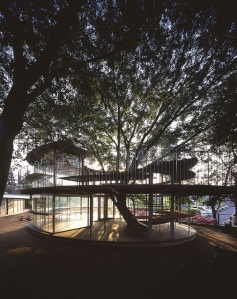July 24, 2017

Anju Sara
The blog’s new contributor Purva Ladge did an interview with Anju Sara, whom she describes as an architect by profession and an environmental psychologist at heart. Anju currently works as an architect at Terrafirm Projects Ltd., Kochi, India, after finishing her Architecture degree at Sathyabama University, Chennai, India, and Environmental Psychology degree at Surrey, UK. She hails from Kerala, India, but has lived most of her life in Abu Dhabi, UAE. Anju has been kind enough to share with us her journey to Surrey and back. Continue reading →
Posted in career in environmental psychology, career in EnvPsych, study opportunities |
3 Comments »
April 11, 2017

Tuvshinzaya Amarzaya
Since one of the main reasons people visit this blog is to learn about environmental psychology and getting resources to delve further into the field, many readers might find it interesting to learn about applying for Environmental psychology PhD programs from someone who recently experienced it first-hand.
Tuvshinzaya Amarzaya, a recent Psychology B.A. graduate and a Watson Fellow from Ulaanbaatar, Mongolia, has been applying for PhD programs in environmental psychology all over the world during the past few months. She has some insights to share with us. Continue reading →
Posted in career in environmental psychology, career in EnvPsych, study opportunities, travel |
Leave a Comment »
August 6, 2015
I’ve recently re-read Alain de Botton’s Architecture of Happiness, a very popular book that deals with much of what I’m trying to learn about, though from a different, philosophic perspective. One of the book’s starting ideas comes from another author: beauty is a promise of happiness, wrote Stendhal and de Botton discusses what this idea means in the world of architecture. His interpretation is that we perceive a building as beautiful if we can imagine ourselves living happily in it.

Dream homes for my students
I often wondered how to translate these kind of observations and ideas into research domain. An opportunity to investigate the relations between buildings, especially homes, and happiness came from my work in school. In a popular optional homework called „Buy a Home“ my students were supposed to go to a real estate search website and find a home they wanted to “buy”. There was no money limit, but it had to be a property they would be able to take care of on their own (no butlers and housemaids allowed, so they don’t drift too far from the reality). Continue reading →
Posted in home design, interior design |
2 Comments »
May 6, 2015

Wil Whitfeld
Australian landscape architect Wil Whitfeld upgraded his design expertise by getting a Master’s Degree in environmental psychology at University of Surrey last year. Back in Sydney, where he recently started working at Oculus design studio, Wil eagerly accepted my proposition to do an interview about his study experience and the new insights it gave him. He also discusses his poetically titled dissertation research “Walking with your head in the clouds: The influence of pathway design on mindfulness, recall and affective state”, which he is presenting at this year’s EDRA conference in Los Angeles in less than a month. Continue reading →
Posted in career in environmental psychology, landscape design, study opportunities, urbanism |
5 Comments »
April 30, 2015
There are some interesting online courses about design, architecture and urbanism starting soon. Some are new and some are long-anticipated re-runs for me, since I missed previous sessions. Here they are:

Courses about design:
Continue reading →
Posted in courses, courses in environmental psychology, home design, public space, urbanism |
Leave a Comment »
April 29, 2015
Sustainable development is a popular (and important) MOOC topic – I’m happy to notice that the updates to my Environmental Psychology Related Online Courses list are getting longer, mostly due to that topic. Here are some new (or newly discovered) options for learning about different aspects of sustainability:

1. Introduction to Environmental Science at EdX Continue reading →
Posted in courses, courses in environmental psychology, sustainability |
Leave a Comment »
January 19, 2015
Pedagogical traditions seem to be very interested in the effects that environmental factors have on (small) people. Over a century ago, some models like Montessori and Waldorf, which have influenced mainstream kindergarten practice as well, started promoting the idea that a great deal of attention should be put into the fabrics, the materials, the colors and the overall organization of spaces for children.

Fuji kindergarten exterior; photo by 準建築人手札網站 Forgemind ArchiMedia
Since I work in a kindergarten as a psychologist one day a week, I recently had the opportunity to learn more about the psychology of spaces for children. Our small kindergarten was about to get a budget-friendly makeover and we were all asked for opinions. I spent a lot of time looking for research-based guidelines for kindergarten design, as well as coordinating everyone’s personal preferences. Here I would like to share some of the findings, and some inspiring examples and other resources I found.
Continue reading →
Posted in building exterior, interior design, school |
1 Comment »
November 12, 2014
I was recently at a dinner party where a colleague of mine apologized for being a vegan, feeling her choice was somewhat inconvenient and obviously having experienced social judgement for it before. Luckily, there was an ethics teacher present, who assured her that there’s nothing to apologize for, but to be proud of. Others, however, kept their opinions to themselves. Obviously, being a vegan among other philosophy students at liberal arts college the young teacher just finished was one thing, but holding on to her beliefs among senior colleagues omnivores was another. I see her choice as admirable, but having known many people who adopted vegetarian of vegan lifestyle during college but not holding on to it long after their mid-20s, I wonder how she’ll handle social pressure from this point on. It also makes me wonder if there’a way to support vegetarian aspirations, and being mindful about what we eat, but also leaving some room for occasional meat consumption. Is being mostly-vegetarian a goal worth pursuing?

The Reducetarian
Continue reading →
Posted in sustainability |
Leave a Comment »
October 14, 2014
The topic of how people affect the environment makes up one half of the environmental psychology’s story. It is a Yin to its Yang, the complimentary field to the topics of how the environment (both natural and built) affects us. Many studies in environmental psychology target the attitudes and behavior concerning sustainability and climate change, the big issues that transcend the limits of just one science. That is why the third part of my Environmental Psychology Related Online Courses series focuses specifically on these topics. It was very easy to find many promising courses, which is, I believe, due to the fact that many people find sustainability and climate change important and worth learning about. Here are my finds:

 1. Introduction to Sustainability at Coursera Continue reading →
1. Introduction to Sustainability at Coursera Continue reading →
Posted in courses in environmental psychology, school, study opportunities, sustainability |
Leave a Comment »
May 12, 2014

Gordon H. Orians
“We could not understand the environment unless we entered the world already understanding these relationships.” – Immanuel Kant’s conclusion from his Foundation of the Metaphysics of Morals is used by Gordon H. Orians to illustrate his own understanding of how our mind responds to the environment. Observing our fascination with natural landscapes, our interest for animals, trees, flowers, sunrises and sunsets, through an evolutionary lens, Prof. Orians argues that the life of our ancestors shaped what we love and what we fear.
Having realised that our interests in human responses to the environment greatly overlap, prof. Orians and I started a discussion via e-mail. Here are some of his reflexions on the topic, which is explained in detail in his book Snakes, Sunrises and Shakespeare – How Evolution Shapes our Loves and Fears. Continue reading →
Posted in evolution and environment, landscape design, sustainability, Uncategorized |
Leave a Comment »











